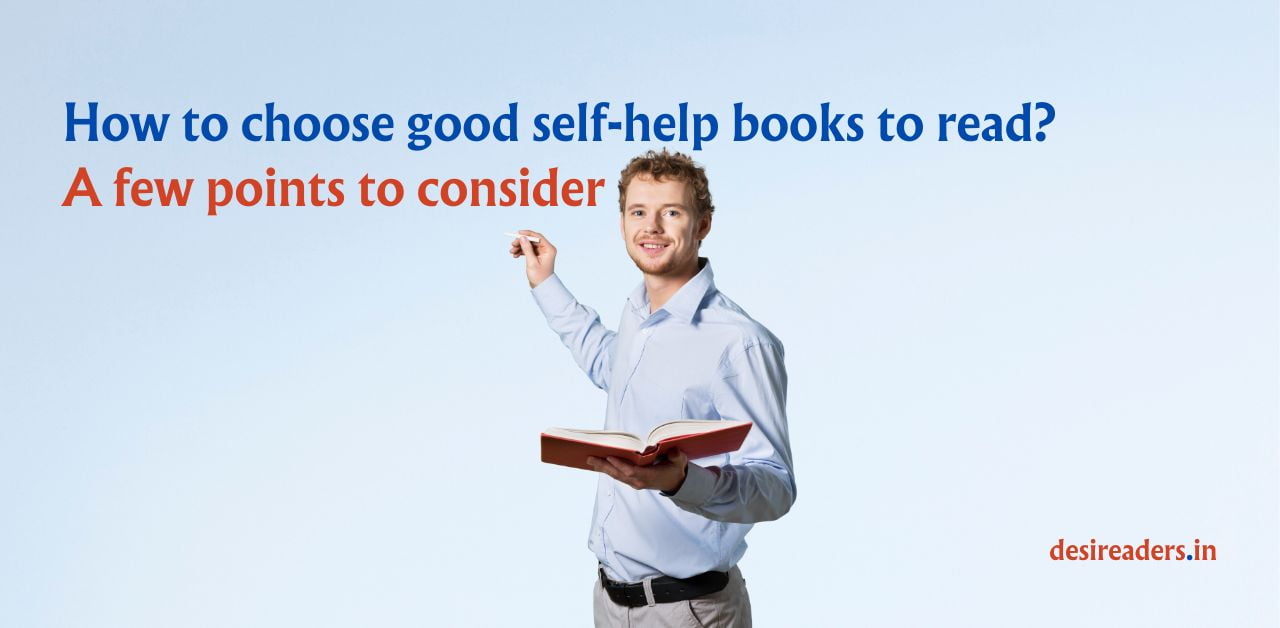How to choose the right self-help book for yourself to read? Key points you must look for while picking up a motivational book
With troubling times and increasing levels of stress and anxiety, the importance of self-help literature has only increased. People from various backgrounds have taken to self-help books to learn about several issues in life – workplace, relationships, management, finance, health, mental well-being and so on. However, all self-help books are not suitable for everyone. People have different needs and requirements for the time. There are certain key elements that one must keep in mind while picking up a self-help book or a motivational non-fiction book to read. In this article, I will discuss what should one keep in mind while picking up a good book to read. Also, I will elaborate what are the qualities that make a self-help book helpful.
A good self-help book possesses several key qualities that can make it valuable and impactful for readers. When choosing a self-help book, there are certain elements that readers should look for to ensure a positive and transformative reading experience. I have read many of the best self-help books of all time. Based on my experience, here are some important qualities and considerations:
1. Credibility and Expertise: And that’s true! A reputable self-help book is typically written by an author who possesses relevant knowledge, experience, or qualifications in the field they are addressing. While picking up books to read, make sure to look for authors who have expertise in the specific subject matter or have conducted extensive research in their area of focus. According to self-help expert Dr. John Grohol, a credible author should have “a combination of academic background and real-world experience” (Psych Central). So, next time you pick up something to read, make sure the author has credibility, popularity and expertise.
2. Practical and Actionable Advice: Anyone can suggest anything. However, the merit of advice and suggestions is best found when you act. And that is one of the critical aspects of a good self-help book is its ability to provide practical advice and actionable strategies that readers can apply to their own lives. Look for books offering step-by-step guidance, exercises, or techniques encouraging readers to take action and implement positive changes. In the words of psychologist Dr. Tchiki Davis, “A good self-help book provides specific, practical advice that you can use to improve your life” (Psychology Today).

3. Clarity and Accessibility: What’s the use of a ‘good’ book that’s very popular but readers at large cannot comprehend the elements in it? A well-written self-help book should be clear, concise, and easy to understand. It should communicate its concepts and ideas in a manner that is accessible to a wide range of readers. Some books are gaudy. Some are daunting with clumsy discussions. Some are utterly rubbish with intellectual garbage! Avoid books that use excessive jargon or complex language, as they may hinder comprehension and the practical application of the book’s advice. According to author and speaker Tony Robbins, a good self-help book should be “able to clearly articulate the steps that will lead to the transformation you’re after” (Entrepreneur).
4. Relevance to Personal Needs: Each individual has unique needs and challenges, so it’s important to choose a self-help book that is relevant to your specific situation or areas of improvement. Consider books that align with your goals, interests, or personal circumstances. Look for reviews or recommendations from individuals who have faced similar challenges and have found the book helpful. The book should resonate with your personal journey and offer guidance that you can relate to.
5. Inspiration and Motivation: Isn’t it the basic purpose of a self-help book? Self-help literature stands on the very basic concept that one should find motivation and inspiration by reading such literature. And therefore, it is expected, at the least, that a good self-help book should inspire and motivate readers to take positive action and make meaningful changes in their lives. Look for books that provide uplifting stories, anecdotes, or case studies that evoke a sense of empowerment and possibility. The book should foster a sense of motivation and instil belief in the reader’s ability to overcome obstacles and achieve personal growth. As self-help author Napoleon Hill stated, “The starting point of all achievement is desire” (Think and Grow Rich).
6. Scientific Validity and Evidence-Based Approach: While not all self-help books are rooted in scientific research, it is beneficial to choose books that incorporate evidence-based practices or theories. Look for authors who cite reputable sources, studies, or expert opinions to support their claims or recommendations. Books that integrate scientific findings can provide a greater sense of trust and reliability. According to self-help guru Brian Tracy, “A good self-help book contains ideas, concepts, and methods that have been tested and proven to be effective in the laboratory of life” (Brian Tracy International).
7. Positive Reviews and Recommendations: Before selecting a self-help book, it can be helpful to read reviews and seek recommendations from trusted sources. Look for feedback from readers who have found the book impactful and have experienced positive changes as a result. Reviews can provide insights into the book’s strengths and weaknesses, allowing you to make an informed decision. You can also ask for recommendations from friends, family, or professionals who know the specific area you seek to improve. You can look at some prominent and best book review websites and critical opinion platforms to do your research about the book.
Conclusion:
I have learnt my lessons after investing 6 years of my life reading books. Along this journey, I came across several authors and books written by them. Self-help literature, at its best, can change someone’s life in a miraculous way! We cannot rush to the professionals every time we lose someone, something or a job. However, books are always there… on-demand, casually, or even as a routine. Nevertheless, to make the best use of them, to take advantage of quality self-help literature, you must have the discerning power to understand which books are good for you and which are not. Always keep in mind that a good self-help book combines credibility, practical advice, clarity, relevance, inspiration, scientific validity, and positive reviews. By considering these qualities, readers can make informed choices and select self-help books that align with their needs, ultimately enhancing their personal growth and well-being.
Please note that the expert opinions are based on their respective knowledge and expertise. I may have paraphrased the opinions, at times, for illustrative purposes and may not reflect their exact words or current views. All the best and happy learning!
By Anand for Desi Readers
